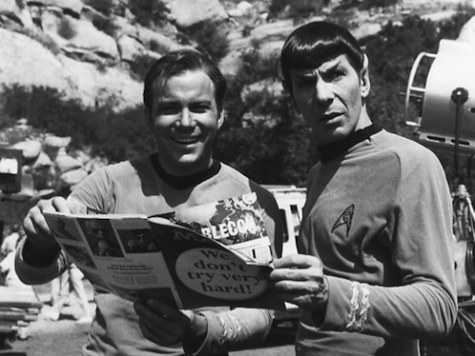You need something to get you through the cold, dark days until you can finally Trek Into Darkness, but Star Trek novels are so much more than something to tide you over until the movie comes out. Here some reasons you should consider picking up a Star Trek novel.
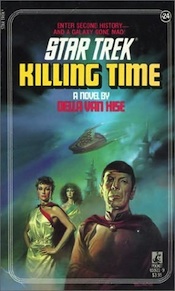 1. So, how’d that work out?
1. So, how’d that work out?
If you’ve ever wondered about the aftermath of an Original Series episode, there’s probably a novel for that. If you don’t like that novel, there’s probably another one that answers the question a different way.
2. They hold the secret history of the 1980s.
And 70s. And 90s. And those other decades when they were published. If you want to see how people’s fears and hopes for the world have changed over time, pick up a range of Star Trek novels. Gene Roddenberry’s original plan for the series was to give people an optimistic vision of the future where the people of Earth could join hands with each other and with the universe and boldly go where no man has gone before. That has meant different things to different people, a number of whom recorded their visions (and thus, their feelings about events that were current to them) in Star Trek novels.
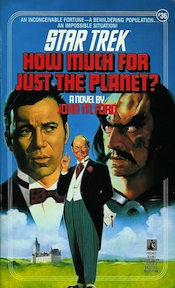 3. They hold the secret history of Star Trek fandom.
3. They hold the secret history of Star Trek fandom.
Where does the crew of the Enterprise go when they need information about the mysterious and obscure? In the television series, they turn to the ship’s computer, but it’s portable. It can’t possibly hold ALL the information about the mysteries of the universe and the unique and varied histories of trillions of people on billions of planets! For that, you need the archives of Memory Alpha, the actual database created by fans, referred to lovingly in more novels than I can count. In addition to celebrating this community effort, Star Trek novel writers routinely inserted themselves, their editors, their fellow writers and their fans into their work.
4. The Bechdel Test.
Female characters in the Original Series ranged from the neglected to the limited in scope. The female protagonist in any given Star Trek novel may be a Mary Sue, but unlike in the television series, she inhabits a universe with lots of other women, and they have conversations about music, medicine, dreams, careers, strategy, ambitions, engineering, and their assorted friends all the time. If this were just an exercise in political correctness, it wouldn’t matter, but there’s a reason why the Bechdel Test works—strong characters who have a lot to say are a vital part of compelling stories.
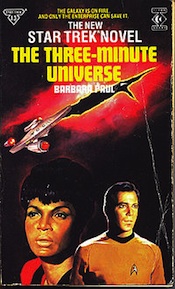 5. Aliens.
5. Aliens.
The people that you meet who are wearing a lot of makeup. Maybe they’re a funny color. Maybe they all have wigs. If the episode had a big budget, you might get both! The novels are completely unconstrained by these limitations. Cat-people, re-incarnating glass spiders, Hortas, sand-whales, flying monkeys, and a species that looks kind of like Irish setters all make appearances. Lots of appearances. Often as fully realized three-dimensional characters.
6. Detailed exploration of alien cultures.
Not only do they show up, these new aliens are interesting and pivotal characters with clearly explained motivations and cultural backgrounds. A 350-page novel gives a writer an opportunity to really dig into a culture. In the early-80s, John M. Ford gave the Klingons an amazingly detailed non-canonical backstory. Diane Duane did incredible work on Vulcans and Romulans. Most other writers were limited to species that did not appear in the Original Series. This didn’t stop them from creating new worlds and new civilizations of their own.
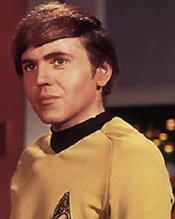 7. Suddenly, Chekov is interesting.
7. Suddenly, Chekov is interesting.
In the television series, Chekov was dropped on to the bridge in the second season to attract a certain demographic. His entire character in season two consists of a bizarre belief that Moscow is the center of both the universe and paradise, and an adrenaline surge that saved his life at significant cost to his dignity. In a good Chekov episode, he gets to canoodle with a girl we never see again. In the novels, he has useful expertise in a variety of contexts—not unlike in the 2009 Star Trek movie where he runs through the ship screaming “I can do this!”
8. All the decks.
It’s not just Chekov who is suddenly interesting. The Original Series used the bridge to tell viewers about who characters were and what they did. Novelists used the whole ship to shed light on the whole crew. The Enterprise has a range of facilities including gyms (with varying levels of gravity), pools, gardens, libraries, dining facilities, observation decks, performance spaces, and a crew that really loves Gilbert and Sullivan.
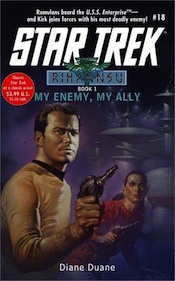 9. The crossovers.
9. The crossovers.
Most Star Trek novels aren’t explicit crossovers with other science-fictional works. But who doesn’t wonder what would happen if all stories were set in the same universe? And if you wonder, why not throw some characters and ideas into the background and see if you can get away with it? Those novelists were a sly bunch and if you pay close attention to settings and characters they’re full of easter eggs that connect Star Trek to other works.
10. Spock really cares about your feelings.
Spock is either emotionless or stoic depending on your take. But he’s also chivalrous and thoughtful, and a really good listener. All that thoughtful listening is really validating when you’re worried that you won’t be taken seriously. Sometimes he even pronounces your concerns logical. I know, “you” aren’t in the book. Just let go a little and take on a Mary Sue, OK? Everyone else does it. It’ll feel good, I promise.
Ellen Cheeseman-Meyer teaches history and reads a lot.










